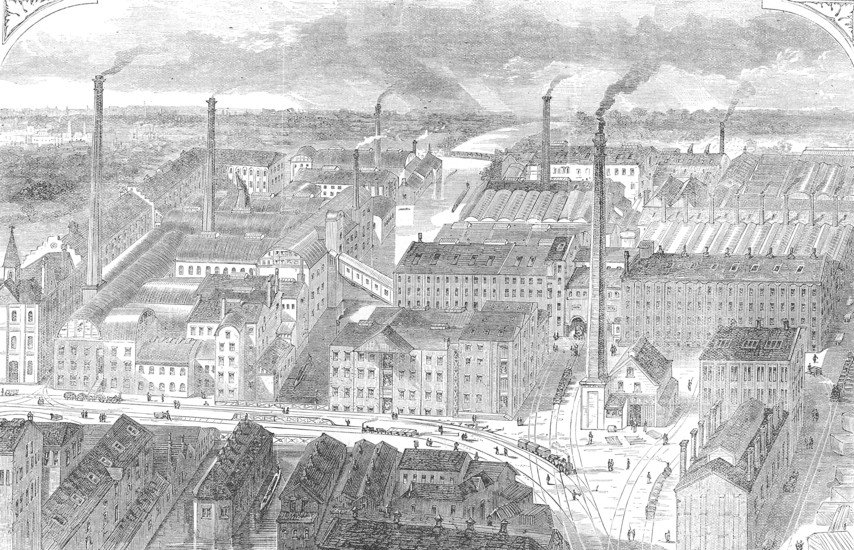
Visit of H.R.H. The Prince of Wales.
His Royal Highness, after having visited the Royal Agricultural Society's Show, drove to Messrs. Huntley and Palmers Biscuit Manufactory, accompanied by Lord Castlereagh, Lord Walsingham, Lord Langford, Mr. J. D. Dent (President of the Royal Agricultural Society of England), Colonel Kingscote, C.B., M.P., Admiral Sir H. Keppel, the Right Hon. Geo. Shaw Lefevre, M.P., Mr. Christopher Sykes, M.P., and Colonel Ellis.
His Royal Highness alighted from his carriage at the principal entrance, and was received by the senior members of the firm, Mr. George Palmer, M.P., Mr. Samuel Palmer, and Mr. Wm. Isaac Palmer; there were also present Mr. Geo. Wm. Palmer, Mr. S. Ernest Palmer, Mr. Walter Palmer, Mr. C. H. Palmer, and several ladies. Mr. George Palmer then proceeded to show the Royal party over a portion of these very extensive works, the Prince being frequently greeted with cheers from the employeés.
His Royal Highness spent some considerable time in examining the different processes, and was shown some of the most interesting features of what is known as the "old factory," and, after crossing the river, the new buildings, in which is the longitudinal lift used for conveying trays of biscuits from the manufacturing rooms to the sorting room, were visited. The process of preparing, making, and baking the biscuits was pointed out and explained to his Royal Highness by Mr. Palmer, the Prince asking many questions. From the large Continental room the party went up in the lift to the export room; then, by means of the lift, descended into another room, recrossed the river, and, after inspecting the shoot where goods are dispatched to the place where the railway waggons stand, they quitted the buildings. Before leaving the factory his Royal Highness signed the visitors, book, and expressed himself much pleased with his visit.
A visitor who is so fortunate as to have permission to inspect this large and interesting factory will first be shown the mixing room, where the materials an thoroughly incorporated with each other, and where the plastic dough is passed many times between massive rollers, and, after repeated pressure, reappears in snowy sheets of uniform thickness and perfect smoothness, Travelling on, still untouched by human hands, it moves under ingenious knives, which swiftly and surely cut it with exactitude into the requisite sizes and shapes. Then, by the same unseen agency, the new formations are released from their encircling network, and are straightway borne to the ovens, which are marvels of moving mechanism. In these the biscuits are carried onward upon a travelling web, the speed of which is regulated with the nicest precision.
Many of the smaller biscuits are cut out by the machines, at the rate of 4000 per minute, while even " Lunch" and "Picnics" are run off at the rate of 1200 to 2000 in the same short period. Digestives, Wafers, Pearls, Ginger Nuts, Rusks, Marie, Osborne, Albert, Oaten, Milk, and over one hundred and fifty other curious and useful forms tempt the eye; while the widely-spreading odour of the varied spices used attracts the nose of the most casual visitor, as the flavour will also gratify his palate.
Numerous packers are at work in several rooms filling the cases and boxes, and placing the cakes in their gay trapping of coloured papers.
The several outlets—home, continental, and foreign are dealt with in distinct packing departments, to suit the varied modes of transit, and marking the division of labour, without which in these days no trade can prosper.
All the departments are furnished with complete sets of hoists from floor to floor, and with overhead railways to carry the crude materials and the full and empty trays and boxes, and thus dispense with hand transport, which in a factory of such magnitude would be almost impossible. Not only is this so within the works, but sidings from the Great Western, South-Eastern, and London and South-Western Railways enable Messrs. Huntley and Palmers, with their own locomotives, to run out several loaded trucks at once, and many thousand tons of biscuits and cakes of all shapes, textures, and sizes are thus dispatched annually.
A large staff of clerks is maintained at Messrs. Huntley and Palmers City House, which is the more strictly commercial centre of the business, and whence a large proportion of the exports is shipped. The immense quantities of raw materials required for the purpose of manufacture at Reading find their market mainly in the City, so that both in reference to the imports and the exports, it forms no exception to the general rule that the greatest provincial manufactures of the country are necessarily linked to London, of which, indeed, owing to the splendid railway service which exists, Reading may now be almost regarded as a suburb.
The fact that about 3000 workpeople of both sexes are employed in the manufacture of biscuits by Messrs. Huntley and Palmers tends to show the extent of their business both at home and abroad; and the indirect employment thus given, in the supply of materials, coal, &c., must be very considerable.
Messrs. Huntley and Palmers have provided a Reading room and Library for the use of the Factory hands. Nearly every creed, denomination, and shade of religious and political thought are represented in this little manufacturing world in which all are alike, free, and yet are linked by common interest and mutual good will, which happily find frequent opportunities for cordial and outspoken expression, and upon many of these occasions a generous tribute has been paid by all the members of the firm to the loyalty of those whose cheerful co-operation has contributed so much to the reputation and success of the House. The senior member of the Firm, Mr. George Palmer, has represented the borough of Reading in Parliament since the year 1878.
Source: The Illustrated London News, No.2256—Vol. LXXXI, Saturday, July 29, 1882, p.123
